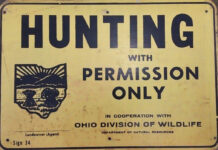Sometime in the early summer of 1965 I migrated from my mother’s hot kitchen and the family’s enormous garden to our farm’s sweltering hayfields and crowded milking parlor.
I did it the usual way. When my mother wasn’t looking, I went over the wall that separated the home’s dull domesticity from the farm’s agricultural adventure.
On one side was potato peeling, on the other tractor driving
Reasons. I did it for another reason, too: money.
My mother didn’t pay; my father did. Well, he paid a flinty 50 cents per hour, but he paid faithfully on the 15th and final day of each month.
That first season of breaking away, however, often found me farmed out – returned – to the kitchen when Dad couldn’t keep five field hands (two were my older brothers, Rich and David) fully employed.
It was humiliating. There I was cutting coleslaw or slicing tomatoes while real men were cutting hay or stacking bales.
They were cracking jokes and making money and I was making dinner with my sister or canning corn with my mother.
Hit the road. As that summer drifted toward the heat of wheat cutting and the season of straw baling, I got better at beating my mother at the cooking, canning and cleaning game.
I developed a number of ruses to hit the road and, a week or two later, pay day.
By far the most effective was to rise very early and walk the quarter-mile to the dairy barn. There, at 6 a.m. each morning, the hired men would gather for two day-starters – a cup of bitter, instant coffee and their marching orders from my father.
Any summer’s day orders rarely varied: unload three or four wagons of hay from the previous day’s baling; return to the hayfield to pick up the two or three loads of bales “kicked out on the ground” by my brothers or Uncle Honey after the hired men’s 6 p.m. quitting time the day before; return to unload this second helping of alfalfa.
It was noon by the time those chores were completed.
More help. The farm’s sacred dinner hour followed, then the sweaty cycle began anew. I didn’t care because I was a couple of bucks richer and another morning removed from the kitchen.
Moreover, since each day promised endless heavy lifting, the hired men were only too glad to have a puny pup like me roll the bales either off the wagon or around the stack to save them steps and energy they’d surely need later.
Likewise, my father – who had to be on to my daily great escape – never sent me home. I guess he figured any labor I saved his well-muscled, muscled-headed crew was worth at least 50 cents an hour to him and the farm.
Going back. The plan wasn’t foolproof, though.
Rainy days, a blessing my father (and the hay-hating hired men) prayed for every hot, humid summer day, always washed me right back into the kitchen.
If the rain didn’t strike until later in the day, however, I usually hid out in the hay shed with the creatively swearing, always belly-aching, cigarette-rolling hired men.
The following summer brought less sneaking away and more paychecks. By then I could reach the clutch on the old AC well enough to be the farm’s go-to hay-raker each morning.
In the afternoon I usually hooked bales from the heaving Oliver baler to drag back to my father or brothers stacking the load.
Promotion. Then, finally, serendipity struck. One day a hired man quit (by simply failing to show up) and I moved into his spot.
The promotion inspired me to ask my grandfather, the farm’s ultimate boss, for a raise from 50 cents per hour to $1.
“Well now,” my grandfather snorted, “a dollar an hour is a man’s wage and all I see standing in front of me is a boy.”
Yes, I replied sassily, but at least I’m not a kitchen boy.
“I can fix that,” he said dryly. The threat was so terrifying that I left without the raise or the urge to ever ask for another. And I never did.
(Alan Guebert’s Farm and Food File is published weekly in more than 75 newspapers in North America. He can be contacted at agcomm@sbcglobal.net.)













